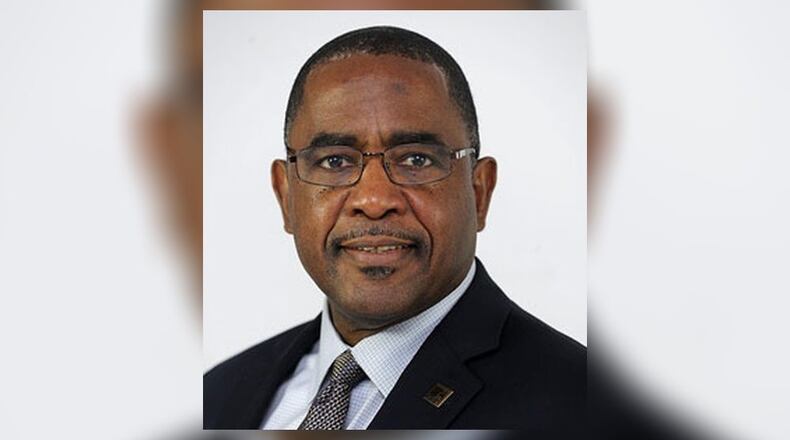RELATED: What can we do to combat racism? Local experts weigh in
There’s been a tragic and complex history of injustices to a number of groups in the United States, particularly black Americans and other people of color, said Lawrence Burnley, vice president of diversity and inclusion at the University of Dayton.
“That history can be traced back to the creation of chattel enslavement itself, and the invention, if you will, of race, of all social construction that was created to position largely European men in a position of dominance,” he said. “That would allow them to maximize their wealth. And so what got us to this point are the reality of racist practiced ideology and policy that manifests itself in a variety of ways in physical violence, psychological violence and emotional violence.”
RELATED: Demonstrators gather in Yellow Springs to protest death of George Floyd
Many of the inequities, from a black American perspective, connect over a broader history, and they include the way in which the justice system has been applied to black people, said Robert J. Clark, a history professor at Cedarville University. That history, which includes unpleasant experiences with police officers, socio-cultural issues, urbanization and urban poverty, have caused a boiling point of emotions and anger to surface, he said.
SHARE YOUR THOUGHTS: ‘Courageous Conversation’ on black community, police relations in Dayton set
Injustices and incidents of police brutality have plagued the black community for decades. But social media, the Black Lives Matter movement and modern technology are bringing them to a wider audience, said Sharon Lynette Jones, professor of English language and literature at Wright State University. The cumulative effect of those repeated patterns has reached this point, and now there’s been an international outpouring in relation to Floyd’s death.
‘Structured ignorance’
The country’s education system is partially to blame for why race relations don’t seem to be improving, allowing injustices to continue, area experts said. Educators are in a unique position to teach students about race and expose them to a variety of perspectives, said Michael Carter, senior advisor to the president and chief diversity officer at Sinclair Community College. Sinclair encourages its students to have face-to-face dialogues in the classroom about race and other difficult topics with people from different backgrounds and ethnicity, he said.
RELATED: Dayton community-police official resigns, cites frustration with DPD leaders
“That enables people to inform themselves, and also if they have notions that are not wholesome or informed, people are able to correct those or at the very least have a debate about them,” Carter said.
However, the education system in general has not done a good job of educating more students about race and diversity in general, Burnley said. For instance, some individuals don’t understand the reasons for the recent protests, and have asked, “Why are they so angry?”
“The question alone, I think, has to be challenged,” Burnley said. “For someone to not have a clue means either complete denial of the history of contemporary reality or it’s kind of an acute case of color blindness or what I call structured ignorance. I think our educational policy or practices in this country plays a role in that.”
‘Marginalization and exclusion of historical facts’
There is a narrative among dominant groups in the country, and they romanticize their experience of exceptionalism, intellectual superiority, the genesis of civilization, and they believe that everything good comes from Europe, he said. In the meantime, African history and black people are demonized.
DETAILS: Ties cut to local CEO after Facebook remarks: Dayton Business
Still, society claims to be committed to academic excellence while at the kindergarten level through terminal degrees there’s a persistent marginalization and exclusion of historical facts about the contributions of pre-colonial African societies and the like, Burnley said.
“We’re graduating people with PhDs, giving them honors of summa cum laude without having any critical examination of their history, and we call it excellence” he said. “Popular media such as movies and TV reinforces this narrative.”
RELATED: How to talk with your kids about unrest, racism: ‘Be honest’
If society is going to dismantle racism, people must first take the time to fully understand it, including its history, the racist policies and have open dialogue, as uncomfortable as it may be, Burnley and other area experts said. Peaceful, vigilant protests like the ones that have been taking place around the area the past couple of weeks are part of the process because they highlight injustices and get the attention of people in power, Burnley said.
READ MORE: Miami University officials: Professor accused of making racist remark at Oxford protest
The current unrest around the country is unfortunate, however, this could be a turning point for the nation, Liza Abram Benham, a political science professor at Central State University, said.
Similar to the Civil Rights Movement, people should use this occasion to push for much more substantive and structural changes, she said. There needs to be a greater focus on police reform, and the militarization of police departments, which started after 911, should be reversed, Benham added.
RELATED: Protesters in Huber Heights denounce racism and police brutality
“(Police departments) got all of this money, which is great, but they’re not using it effectively to protect,” she said. “So they should tackle things such as programs to break up the school to prison pipeline, domestic violence” and murder.
Staff writer Ismail Turay Jr. spoke to experts about the circumstances that lead to protest in the wake of the killing of George Floyd, a black man, by Minneapolis police
Join the conversation
The Dayton Daily News Courageous Conversations: Relations Between Dayton’s Black Community and Police is set for 6 p.m. Wednesday, June 10.
Lawrence Burnley, the University of Dayton vice president of diversity and inclusion, is among seven panelist participating in the event.
The discussion will streamed live on Dayton Daily News’ Facebook page. Questions will be taken from the audience.
About the Author
